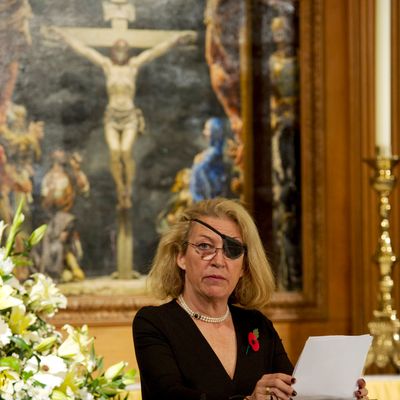
Two journalists were killed in the Syrian city of Homs early on Wednesday as the yearlong uprising against President Bashar al-Assad rages on. American reporter Marie Colvin of the Sunday Times of London and French photographer Rémi Ochlik were reportedly hit by a rocket attack in a house doubling as a “makeshift media center,” where three other Western journalists were injured, leading some to wonder if the press is being targeted. “Covering a war means going to places torn by chaos, destruction and death, and trying to bear witness,” Colvin said in a 2010 speech. “It means trying to find the truth in a sandstorm of propaganda when armies, tribes or terrorists clash. And yes, it means taking risks, not just for yourself but often for the people who work closely with you.”
Colvin, 55, reported on conflicts in places like Iraq, Chechnya, and Sri Lanka, where she lost an eye, thereafter opting to wear a recognizable black patch. Ochlik, who was in his late twenties, had worked in the Middle East, Haiti, and Congo, winning a World Press Photo award for his work in Libya. “Our mission is to report these horrors of war with accuracy and without prejudice,” Colvin said in her speech. “We always have to ask ourselves whether the level of risk is worth the story. What is bravery, and what is bravado?”
Rupert Murdoch, who owns the Times of London, called Colvin “one of the most outstanding foreign correspondents of her generation” in a statement. He added, “She put her life in danger on many occasions because she was driven by a determination that the misdeeds of tyrants and the suffering of the victims did not go unreported.”
Rebels have reportedly sustained fire for nearly three weeks in Homs, where the pair was killed, while earlier this month a UN Security Council resolution against Assad was vetoed by China and Russia. (A nonbinding version was passed by the General Assembly.) Seventy-nine deaths were logged around the country on Tuesday. And at least four journalists have been killed since November, along with Anthony Shadid of the New York Times, who died last week of an asthma attack during an assignment in Syria. Rami al-Sayed, a Syrian citizen journalist, was also killed in shelling on Tuesday. Some believe that the government is targeting journalists to isolate the opposition. “It’s too much of a coincidence,” said one activist. “There are reports of planes flying around and they may be looking for the satellite uplinks.”
In an interview yesterday, Colvin spoke of watching a baby die after being hit with shrapnel. “That is happening over and over and over,” she said. “No one here can understand how the international community can let this happen.” In her 2010 speech, Colvin said, “The real difficulty is having enough faith in humanity to believe that enough people be they government, military or the man on the street, will care when your file reaches the printed page, the website or the TV screen. We do have that faith because we believe we do make a difference.”





























